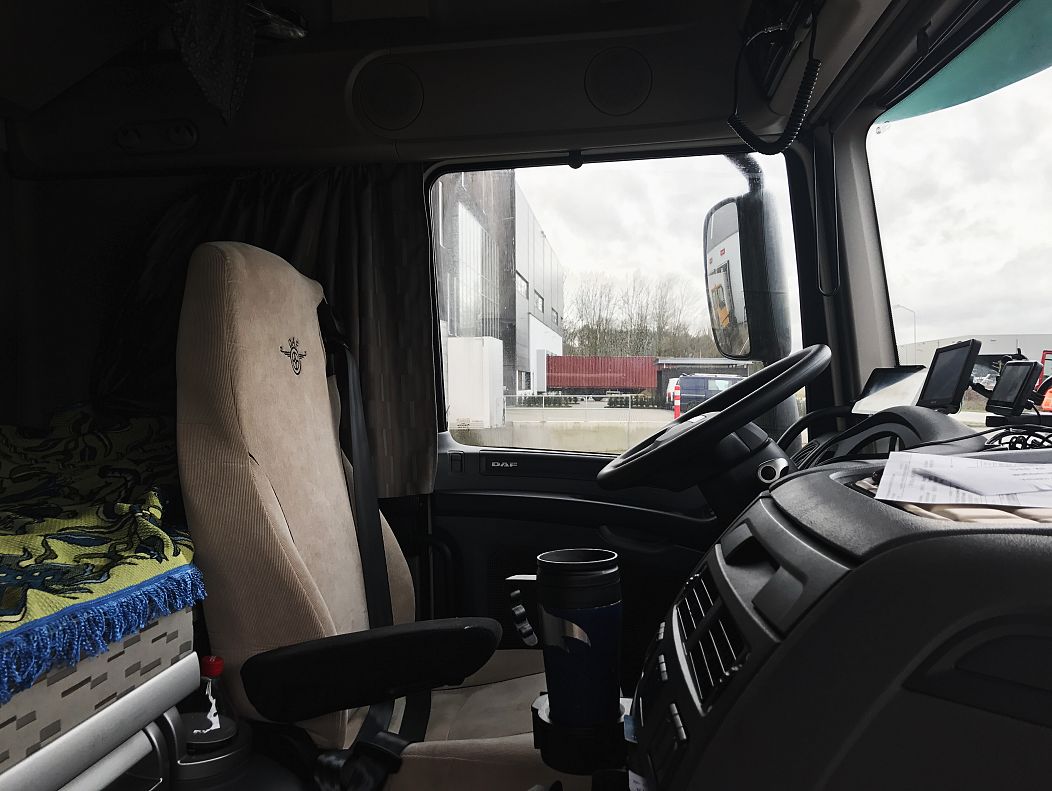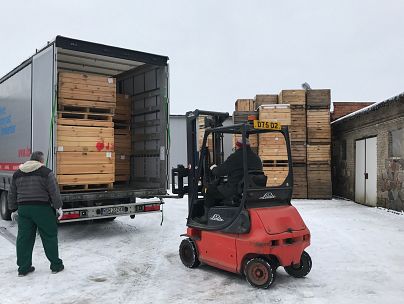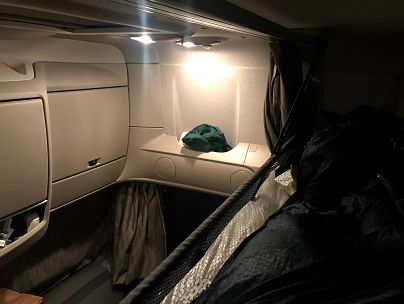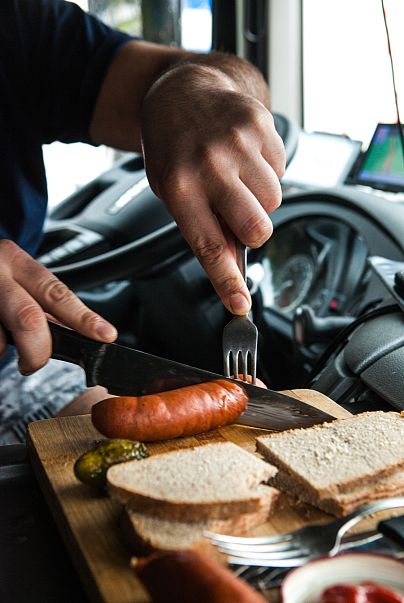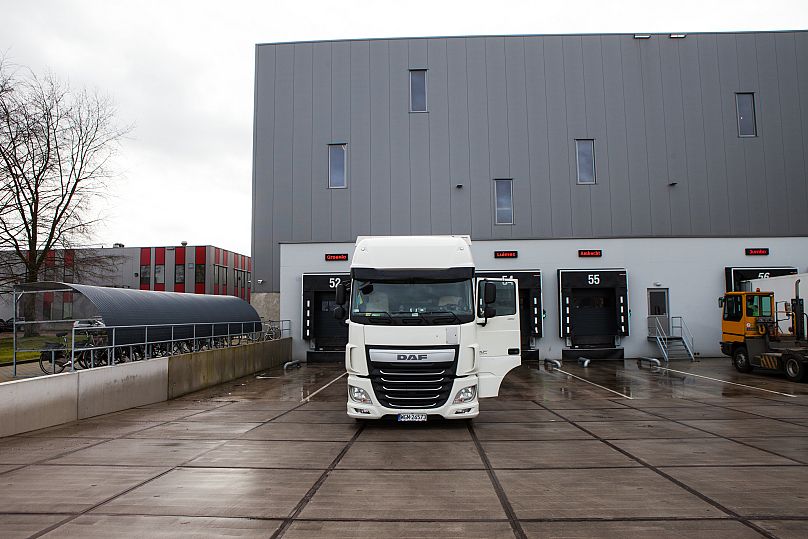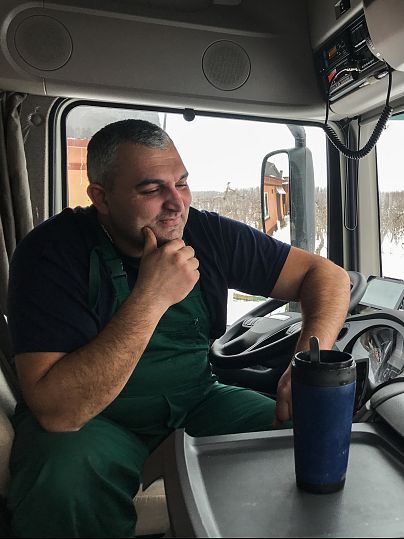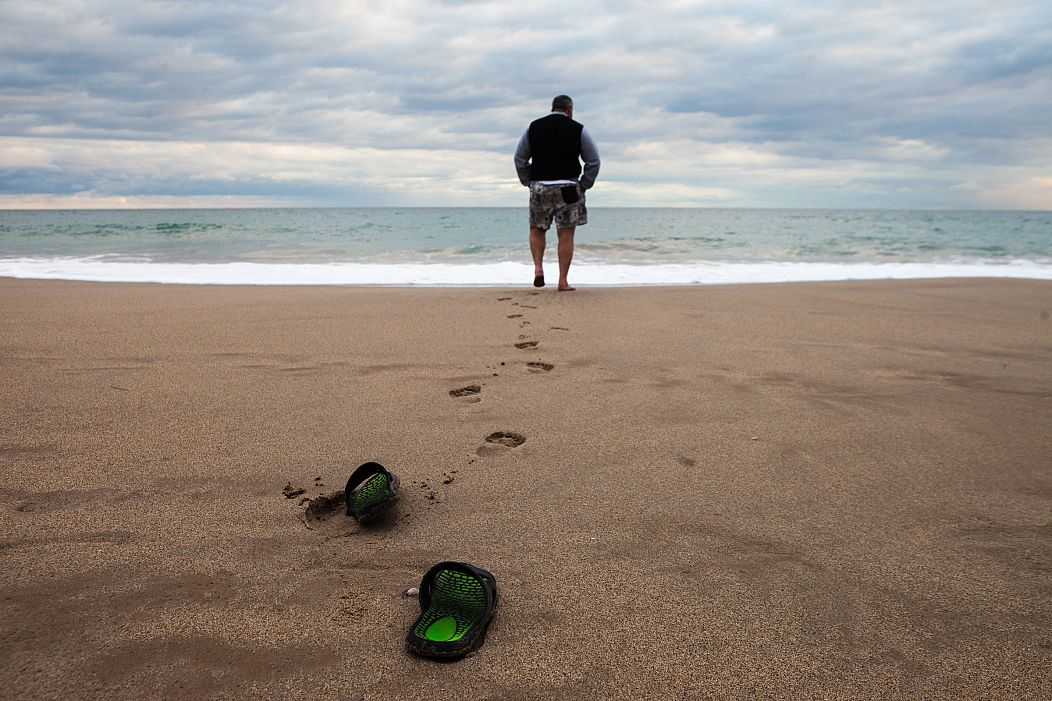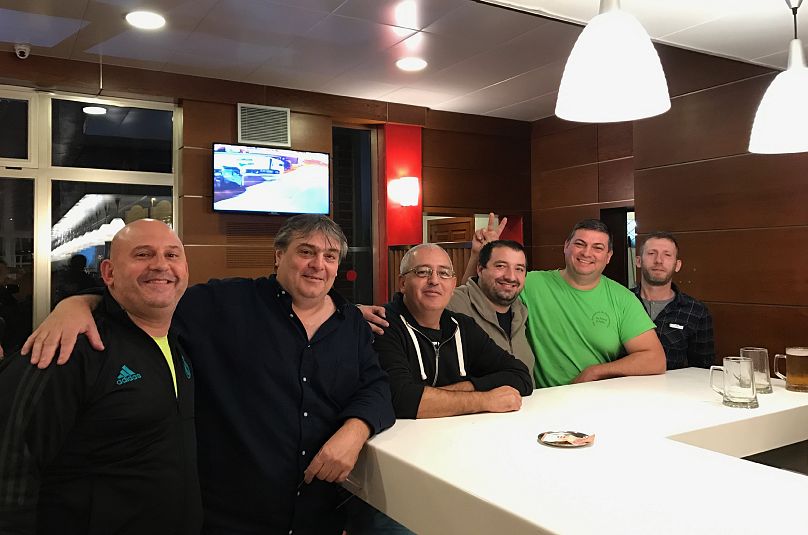Life in a cab: our journalist spent 9 days trucking across Europe to uncover the human price of road transportation.
Video: A typical day for a European truck driver
On early Monday morning, I find myself sheltering from the wind between parked trucks on the outskirts of the Polish capital, Warsaw. It’s 6 degrees below zero, everything is frozen and covered with snow.
Just as I feel I’m about to freeze solid, a driver called Ruslan walks towards me, coatless, wearing slippers on his bare feet. A month previously he had agreed to take me on board for a journey across Europe.
Amid changes surrounding the regulation of the transport industry and protect domestic workforces, the public has little awareness of what life as a truck driver really involves. The objective of our journey is to uncover the human price of having everything we need in stock at all times in our local supermarket. The delivery drivers who keep the system working sleep in their trucks, they cook alongside their trucks, for days, weeks and months at a time they see little except the road, lorry parks and the inside of their cab.
Day 1
Ruslan opens the doors of the truck’s cab, inviting me in. Immediately I am stuck on the way up to my new temporary home of fives metres squared. I hadn’t expected climbing skills to be required, as you have to take off your shoes on the way up and leave them on the steps. All the truck drivers I met do this - dirty shoes stay outside.
Today Ruslan is coming back to work after holidays with his family in Ukraine. It took him 24 hours to make it to the logistics centre near Poland’s capital. He had a good rest in his truck before starting the new working week.
The truck we are in is the one he always drives. Its cabin is his home on wheels for the many months ahead. There is a bed right behind the driver's seat, covered neatly with a blanket.
Ruslan fills up a tiny fridge, a storage drawer under his bed and another storage space outside the cabin with the different products he has brought from Ukraine, including some vegetables, raw meat and cooked meals, for example, chicken, fried by his wife. He also did grocery shopping in Poland on his arrival. Most likely he won’t be home before the summer!
Loading the truck
The trailer of the truck was already fully loaded when Ruslan picked it up. So he starts his working week with a delivery. We drop off empty wooden apple boxes to a farm just an hour’s drive where we started our journey. Unloading takes around 2 hours. The farm’s owners help with the job while everyone has a friendly chat.
Transportation logistics are organised so that the truck does not travel for a long time empty. In 20 minutes we are already at another farm to collect similar boxes. The document Ruslan received says this new cargo has to be taken to the Netherlands. The truck cannot be loaded immediately though, as the loading time was set for 3 hours later.
While waiting, the driver cooks a meal, does the required paperwork, plays games on his smartphone and calls his fellow-colleagues to catch up after holidays. Once the loading starts he is concentrated on the process, he helps the farm workers to load the truck. The work is done in a bit over 2 hours. So we are ready to go five hours after arriving.
The time felt an eternity to me. It’s so far from a normal day in the office. After a day full of assignments most workers head home to begin their private lives. But for a truck driver, loading and waiting time is not included in regulated driving time, therefore Ruslan can drive until almost midnight so that’s what he does.
When his day, which started at 8.30 draws near its end, the driver finds a parking spot to stop for the night. He takes the gas cooker he carries outside the cab and warms up a meal. Before going to sleep, we watch a film on his personal computer. He then falls asleep on the first level bed, I climb to the bunk bed above.
Day 2
In the morning Ruslan brushes his teeth out of the truck’s window. I leave truck my pyjamas despite the sub-zero temperatures to fulfil rather urgent basic needs. Walking between lines of trucks to find any kind of facilities. The drivers don’t seem to care, neither about the cold nor about the toilets and showers in dirty metal boxes somewhere out in the parking. He warms up the kettle, makes coffee for us and we are ready to go.
Resting time and meals
Following European regulations, after 3 hours driving we have to stop for a 45-minute break. I head over to the roadside shops and cafes to pick up some snacks and a breath of civilization. The driver never buys anything there – it is too expensive.
“I cook myself. Because they don’t have borsch (Ukrainian beetroot soup) or any soups at all in roadside restaurants here. In the cafes, they have french fries and fried meat. And we all need a proper meal. And we also need to save money,” Ruslan says.
Exceptionally he eats a zurek - polish soup - in a canteen aside the busy road. It costs a bit more than just a euro but the driver does not have to pay. He washed the truck here and got a ticket in the restaurant for that.
He also does some shopping at a service station in Poland. Further to the west things will get only more expensive.
We then drive through Germany and the weather gradually gets warmer. Our final stop of the day is very close to the Netherlands.
Day 3 and 4
We crossed the border to the Dutch side early in the morning the next day and found our delivery spot. Unloading the car takes few hours again, I am already getting used to how slowly the day goes.
The next pick up is in the northern Netherlands, where the process of registering the truck is automated. The driver filled in forms in the cab with two computers. Here he also loads the truck on his own, using lifting equipment. And the line that delivers the products was also automated. Now we will transport the goods to Spain.
In between is just 1,420 kilometres through the Netherlands, Germany, Belgium, Luxembourg and France.
Timing and safety
The driver knows the road very well, but he has to plan carefully to find a space on a parking lot at the right time: when he has to stop for a short break or for the night. He cannot stop too early or too late when his driving time comes to an end. Fines can reach thousands of euros and both the driver and the company get fined, sometimes the companies pass everything onto their driver.
The driver also has to think about safety, which remains a major big issue on European roads. Ruslan tries to stop at parking lots offering security as the company is happy to pay, but they are not always available. Some areas are more dangerous than others, the driver says. Thieves can cut a hole in the side of the trailer and remove the goods. Even relatively inexpensive products, like snacks, for example, can be stolen. Trucks that transport cars or medicine, never stop at free parking lots.
At the end of the week, Ruslan hears from another driver - gas was pumped into his cab to knock him out. He awoke to find out part of the cargo, his company credit card and some personal belongings were stolen. There are few ways of blocking truck doors from the inside to prevent this kind of robbery. Some trucks have it pre-installed, some drivers buy metal braces or use belts to tie both doors together so that they cannot be opened from outside. Ruslan is well aware of the threat.
“This happened to me too, they tried to open my door, they cut the canvas to see what I was transporting. We need more paid parking spots in Europe, protected by a fence so that thieves cannot get in. Usually, they come with vans totally prepared to steal your fuel. We also need CCTV cameras to work to fix this.”
Day 5 and the weekend
Despite his best efforts, Ruslan could not get his products delivered to Spain by the end of the working day on Friday. They will have to remain in the truck for the whole weekend and be delivered for the beginning of a new week.
The driver has to take a 45-hour uninterrupted break after a working week of 45 hours. European legislation forbids the driver from sleep in his truck during that time. This rule was designed to allow European drivers to head home to rest. But drivers who come from further afield cannot return anyway. Hotels are also not an option most of the time - roadside infrastructure is not developed enough and drivers cannot afford the cost or leave their cargo without surveillance.
“Near the parking, where the trucks stop, there are no hotels. To reach the hotels you need to spend time and money, then to spend on the hotel. The firms don’t pay that. Plus no one is watching the vehicle, like this you can come back after the weekend and find the truck without its cargo and fuel,” Ruslan explains.
Some countries conduct strict controls over the regulation, like Germany and France. Others, like Spain and Italy, tend to overlook infringements and transportation firms build their logistics to ensure drivers find themselves in the latter areas when they need to take a long break.
In Spain, Ruslan picks parking near Altafulla village, not far from Tarragona. There is a self-serve buffet there that costs 12 euros. If the driver eats there then the parking for the truck is free. If he does not eat, then he pays for the parking. The restaurant here is of a really decent quality and the beach is just about 500 meters away.
“I really rest here this weekend,” a Belarussian driver called Sergey tells me. “Not like at the last place.”
Indeed this parking spot seems to stand out among the others I got to see during the trip, usually they unwelcoming giant spaces just aside a busy arterial roads with shops and warehouses.
45 hours stop. What do drivers do?
On arrival at the parking lot, I spotted a German driver transporting cars. I planned to talk to him, but as time went by I realized he wasn’t going to leave his truck. In the end, I had a chat with him through the window of his cab as he was about to head off. He told me he plays games on his phone or talks with his friends on messenger apps, calls his wife or browses Facebook.
“I don’t go out to the sea or the bar, even though I stay here quite often,” he said.
Nevertheless, the cosy bar near the parking spaces is full. Drivers can order drinks and a meal.
Claude, a French truck driver who works for a Swiss company, seems to know everyone. He shares a drink with Portuguese and Spanish drivers as he prepares to watch a football match.
Claude introduces me to his fellow-drivers and says he has known them for years. They meet when they stop at the same parking spot. Every time he arrives here he finds a familiar face. A barman, probably in his late 50s, also seems to know everyone. They are all surprised to learn I am not a truck driver although I was sure I stood out - few non-drivers ever visit, although they would be made welcome. My drinks were paid for before I could say a word or figure out who exactly picked up the bill.
Drivers share a strong camaraderie. There’s no friction between those from east and west Europe, despite criticism in parliaments and the media of “social dumping”. Drivers tend to blame their companies or governments for allowing rivals to accept poorer conditions.
In the bar, I got an invitation to a Portuguese dinner my new acquaintances are about to cook near their trucks. It was quite late and completely dark when the drivers started cooking. They opened all the storage cupboards of their trucks to take out salad leaves, eggs, and sausage. Storage doors became the tables. Pans are placed on a portable gas cooker. One of the drivers holds a light from his mobile phone. When the meal is ready, the drivers eat it directly from the pan, putting it on a piece of bread or just straight into their mouths. They sing songs and laugh enjoying each other’s company. Tomorrow they will part ways to continue the journey.
Day 8 and 9
Early on Monday morning we make our delivery in Spain and pick up new products to transport back to Germany. The driver goes through France again - that’s where I got off the truck. For me, this is the end of the journey, for the driver though it is just one of those hundreds of days until he gets to sleep in his own bed and see his loved ones.
This research was enabled by Reporters in the Field, a program by the Robert Bosch Foundation hosted together with the media NGO n-ost.












